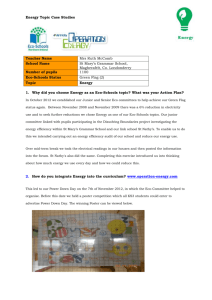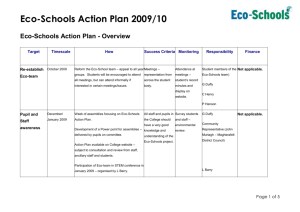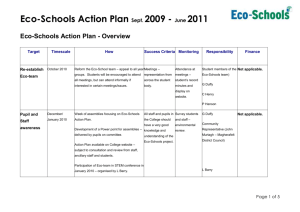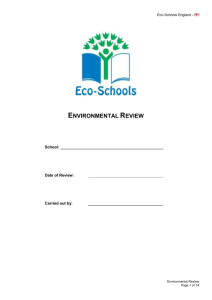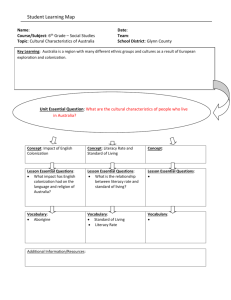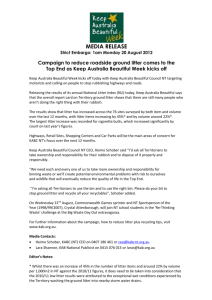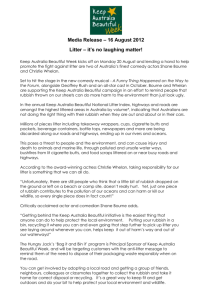Eco-schools australia environmental review
advertisement
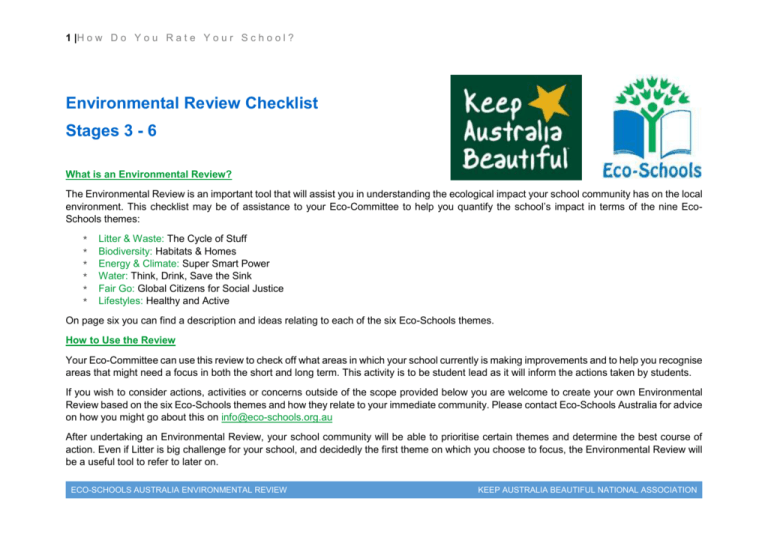
1 |H o w D o Y o u R a t e Y o u r S c h o o l ? Environmental Review Checklist Stages 3 - 6 What is an Environmental Review? The Environmental Review is an important tool that will assist you in understanding the ecological impact your school community has on the local environment. This checklist may be of assistance to your Eco-Committee to help you quantify the school’s impact in terms of the nine EcoSchools themes: * * * * * * Litter & Waste: The Cycle of Stuff Biodiversity: Habitats & Homes Energy & Climate: Super Smart Power Water: Think, Drink, Save the Sink Fair Go: Global Citizens for Social Justice Lifestyles: Healthy and Active On page six you can find a description and ideas relating to each of the six Eco-Schools themes. How to Use the Review Your Eco-Committee can use this review to check off what areas in which your school currently is making improvements and to help you recognise areas that might need a focus in both the short and long term. This activity is to be student lead as it will inform the actions taken by students. If you wish to consider actions, activities or concerns outside of the scope provided below you are welcome to create your own Environmental Review based on the six Eco-Schools themes and how they relate to your immediate community. Please contact Eco-Schools Australia for advice on how you might go about this on info@eco-schools.org.au After undertaking an Environmental Review, your school community will be able to prioritise certain themes and determine the best course of action. Even if Litter is big challenge for your school, and decidedly the first theme on which you choose to focus, the Environmental Review will be a useful tool to refer to later on. ECO-SCHOOLS AUSTRALIA ENVIRONMENTAL REVIEW KEEP AUSTRALIA BEAUTIFUL NATIONAL ASSOCIATION 2 |H o w D o Y o u R a t e Y o u r S c h o o l ? How to rate your school Go through the checklist below and mark off your response on behalf of your school to each question. Rate your school on a scale of one to five as per below: 5 Yes, we are champions in this area! 4 In this area we have taken positive steps but we still can improve. 3 We’ve just started our journey! 2 Hmm, we’re in the planning stages. 1 Ha! We never thought of that – thanks for the idea! The light bulb image is a comments section where can mention some of the great ways in which your school is focusing on this area. You can also write down ways in which you think you could improve and what projects might be a good starting place. Example B Is your school litter free? Yes our SRC runs a Litter Awareness Campaign a part of Keep Australia Beautiful week and we educate students and staff about where their litter can end up. Since we did this we have seen a huge reduction in litter in the playground and 99% of students placing their rubbish in the correct waste or recycling bin. ECO-SCHOOLS AUSTRALIA ENVIRONMENTAL REVIEW 5 KEEP AUSTRALIA BEAUTIFUL NATIONAL ASSOCIATION 3 |H o w D o Y o u R a t e Y o u r S c h o o l ? ECO SCHOOLS ENVIRONMENTAL & SOCIAL IMPACT REVIEW Litter & Waste: The Cycle of Stuff A Does your school have good indoor and outdoor infrastructure to encourage waste and recycling separation? B Is your school litter free? C Is paper for printing made from post-consumer materials or certified by the Forest Stewardship Council? D Does your school have a compost, scraps system and/or worm farm for organic waste? E Does your school purchase second hand items or up-cycle materials into new use? Biodiversity: Habitats & Homes A Does your school have natural or built environmental spaces for native plant and animal species? B Does your school have a vegetable/bushtucker garden for students and teachers to enjoy? Does your school have an outdoor learning classroom or do teachers use the grounds for up than 25% of their C lessons? Does the student body communicate with the groundskeeper in regards to use of pesticides and grounds D maintenance? E Do all students get an opportunity to be hands on with the school's natural environment? ECO-SCHOOLS AUSTRALIA ENVIRONMENTAL REVIEW KEEP AUSTRALIA BEAUTIFUL NATIONAL ASSOCIATION 4 |H o w D o Y o u R a t e Y o u r S c h o o l ? Energy & Climate: Super Smart Power A Are energy saving lightbulbs used in classrooms? B Are open windows and fans used more often than airconditioning? C Are computers turned off when not in use? D E Does the school's energy supplier use all or part green energy i.e solar, wind power? Does your school make an effort to off-set or minimise its carbon emissions? Water: Think, Drink, Save the Sink! A Does your school make an effort to collect and use stormwater? B Are there water saving taps and low-flush toilets in bathrooms? C Are students encouraged to use re-fillable water bottles instead of buying one use bottles from the canteen? D Are school grounds watered in the evening or early morning? Does your school use non main supply water (grey water, stormwater, recycled water) for school grounds E upkeep? ECO-SCHOOLS AUSTRALIA ENVIRONMENTAL REVIEW KEEP AUSTRALIA BEAUTIFUL NATIONAL ASSOCIATION 5 |H o w D o Y o u R a t e Y o u r S c h o o l ? Fair Go: Global Citizens for Social Justice Does your school donate or raise money for projects to empower disadvantaged Australians or communities A abroad? Does your school have a procurement policy to ensure all purchases adhere to a triple bottom line i.e does your B school buy Fair Trade, organic products? C Is the school uniform made in Australia from local, environmentally friendly materials? D Does the school partner with other schools around the world to learn and act upon global challenges? E Do students engage and partner with members of the local aboriginal community for various programs? Lifestyles: Healthy & Active A Is the school community encouraged and enabled to ride their bikes or walk to school? B Does your school canteen stock predominantly healthy, low sugar, low fat products? C Are classrooms checked and clear of mould and/or asbestos? D Are students and teachers educated about mental health through awareness campaigns? Do students participate in activities or awareness campaigns that promote healthy, active lifestyles i.e. Jump Rope E for Heart, Fun Runs etc.? ECO-SCHOOLS AUSTRALIA ENVIRONMENTAL REVIEW KEEP AUSTRALIA BEAUTIFUL NATIONAL ASSOCIATION 6 |H o w D o Y o u R a t e Y o u r S c h o o l ? Eco-Schools Australia 6 Themes Litter & Waste: The Cycle of Stuff Where does all our stuff come from, what is it made up of and where does it go once we are done with it? This Eco-Schools theme focuses on the material cycle and how environmentally conscious citizens and students might identify positive ways we can improve and evolve this society’s relationship with materials and waste. Students can aim to tackle littering through awareness campaigns or encourage recycling practice through raising money for improvement waste management infrastructure. Biodiversity: Habitats & Homes Life is a mixed bag! Biodiversity (biological diversity) refers to the incredible variety within, and between, all life species: animals, plants, right down to micro-organisms. In this Eco-Schools theme students aim to discover, understand and enhance their local environment through identifying local inhabitants/species and conserving their homes. This might be in the form of creating a native plant, bush tucker garden to rejuvenate a local Australian ecosystem or ensuring diversity of flowers for bee populations. This theme offers students a chance to engage first hand with the natural environment and consider the impact our lifestyle choices and purchases have on the natural environment. Energy & Climate: Super Smart Power How are we going to power the future? All school communities use resources that can positively or negatively impact the environment and the climate. In regards to energy, there are several smart steps that schools can take to minimise their environmental footprint from installing energy saving light bulbs through to having solar panels on school roofs to generate their own energy supply. This theme gives the student body a chance to understand how they can improve their carbon impact through smart energy choices. Water: Think, Drink, Save the Sink Australia is a country of droughts and flooding plains and as such water is a critical resource. In this theme, students are encouraged to consider how they utilise water in their immediate school community and how the wider community can do more to conserve this precious resource. Students and teachers are encouraged to consider better water catchment and use systems such as stormwater tanks, grey water usage and/or grounds maintenance. Fair Go: Global Citizens for Social Justice What is the triple bottom line? How do your actions and purchases impact your immediate community and the global community? This theme focuses on the ways in which schools might consider their purchasing policy to encourage environmental, economic and social sustainability. Students and teachers are encouraged to positively impact local and global communities through making changes to existing systems or starting a project from scratch such as only purchasing fair trade certified chocolate for the school canteen, organic, fair trade coffee and local products for staff rooms or maybe eliminating palm oil products in the school food tech labs. Lifestyles: Healthy and Active Healthy students and teachers are changemakers! This theme recognises the importance of encouraging healthy and happy habits for students and teachers from undertaking awareness campaigns around mental and physical health right through to providing means for students to ride or walk to school with bike sharing and/or safe walkways and also motorised modes of transport which are more eco-friendly. ECO-SCHOOLS AUSTRALIA ENVIRONMENTAL REVIEW KEEP AUSTRALIA BEAUTIFUL NATIONAL ASSOCIATION


